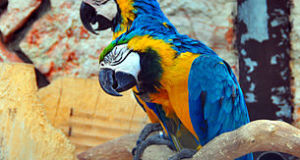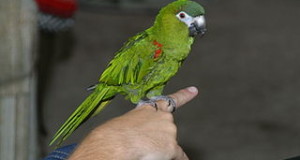It’s well known that birds exhibit an extraordinary degree of care and protectiveness towards their chicks…having been attacked by avian parents ranging from owls to ostriches, I can vouch for this firsthand! As impressive as this may be, most folks tend to accept it as a matter of course – the survival of the species, after all, depends upon the new generation. However, an amazing new study at the University of Bristol (UK) has revealed that female domestic chickens actually seem to exhibit empathy – that is, the ability to share and be affected by the emotional state of another individual.
“Mammal-Like” Qualities in Birds
Empathy, or “feeling another’s pain”, has long been thought to be the providence of humans and, according to some research, other mammals. A recent (March, 2011) article the journal Proceedings of the Royal Society B: Biological Sciences, however, makes a convincing case that at least some birds also posses this trait. The study is also the first to document that birds exhibit both physiological and behavioral changes when witnessing the distress of another individual.
In the experiment, Domestic Hens were separated from their chicks but allowed to observe that puffs of air were being directed at the youngsters. The hens became very alert, ceased preening and began vocalizing at their chicks (behavioral responses). They also exhibited physiological changes, including a drop in eye temperature and a rise in heart-rate…both signs of stress.
I think the most important points that distinguish this from mere protective or fear-based behavior are the facts that the hens themselves were not in any danger and that the chicks exhibited no signs of distress or fear. The hens seemed to “view” or predict the situation as being a stressful one for the chicks, and were affected by this.
In common with many birds, Domestic Hens are also able to learn by observation and experience. Other studies have shown that they avoid areas where other birds have been seen to cease preening and remain in an alert posture (indicating a possible threat).
Pets and Zoo Animals
The University of Bristol researchers were manly concerned with the welfare of farm and laboratory animals. Considering the stressful conditions under which chickens and other domestic fowl are usually raised (please see photo), this is most appropriate.
However, I believe that the work has important implications for pets and zoo animals as well. As we now know, stress weakens the immune system and is involved in an extraordinary number of diseases, parasitic infections and breeding failures…not to mention its affect on the quality of life of both pet and pet-owner. Please see the articles below for more on reducing the stress experienced by captive parrots and finches.
Future Implications…Empathetic Reptiles?
 This new information raises the possibility that empathy, as a trait, may have evolved far earlier than was previously believed. Its presence in birds opens the door to intriguing questions…according to one biologist, we may be looking at a 200 million year old characteristic that is rooted in reptile evolution.
This new information raises the possibility that empathy, as a trait, may have evolved far earlier than was previously believed. Its presence in birds opens the door to intriguing questions…according to one biologist, we may be looking at a 200 million year old characteristic that is rooted in reptile evolution.
Further Reading
Abstract of the Hen Empathy Article mentioned above.
Enriched Environments Speed Healing in Birds
Avian Stress: Furnished vs. Unfurnished Cages
 That Bird Blog – Bird Care and History for Pet Birds
That Bird Blog – Bird Care and History for Pet Birds




Isn’t this interesting!
Hello Lisa, Frank Indiviglio here.
Thanks for your interest in our blog….I agree, it really does seem to go beyond instinctual parental care. Hopefully, it may lead to new findings that will benefit wild, pet and domestic birds and bird keepers.
Please let me know if you need any further information. Good luck, enjoy and please keep me posted.
Best regards, Frank Indiviglio.
Yesterday a Tree Sparrow ran into my window and was injured. A Mourning Dove came and sat right up next to it until dark, when it finally left. I then brought the sparrow into the house, but it died in a few minutes. Empathy? Sure seemed like it.
Hello Lahna,
Thanks very much for the interesting observation; best, Frank
I used to feed wild rainbow lorikeets in Sydney and can give an example of these birds displaying empathy.
One of the birds that I used to feed only had the top part of his beak. I would provide him with a soft feed mix because he could not eat apples like the others. I fed him for about 7 years. One time after not visiting for a few days he arrived with another lorriket that I had not seen before and this bird too only had half a beak. I was blown away that he was looking out for another with the same problem he had.